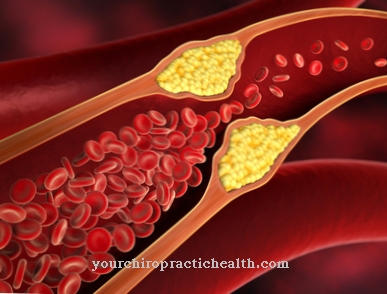The Freeze is an absolutely natural reaction of the body to unhealthy cold, which could weaken the immune system. It only becomes problematic if it occurs disproportionately. Then one speaks of the so-called Sensitivity to cold.
What is freezing (sensitivity to cold)?
.jpg)
Freezing is the body's reaction to cold air. The muscles move jerkily and you shiver more or less severely; the blood circulation is no longer able to warm the outermost extremities such as fingers, nose, ears and toes, they become ice cold.
If there is no reason for being so cold, the sensitivity to cold can also be the sign of an underlying disease, which is usually an infection. Freezing is uncomfortable even when it is appropriate - after all, the feeling should also indicate that it is time to warm up and leave the cold, as it could be harmful to the immune system and health.
causes
Freezing as an observation that is harmless to health occurs when the environment is cold and one is not dressed appropriately. But it is also a common side effect of illnesses that lead to fever.
Freezing occurs, for example, with severe colds, flu-like infections, flu and similar infectious diseases. Sensitivity to cold can also herald infections that have nothing to do with the throat, nose and ears: If bacteria and viruses spread, they often also cause freezing.
Possibly an excessive sensitivity to cold is also due to a general circulatory disorder. This can occur due to low blood pressure, iron deficiency, anemia or medication. Some chemotherapy treatments for cancer patients also cause freezing, such as the preparation 5-fluorouracil (5-FU) for colon cancer and its metastases.
You can find your medication here
➔ Medicines for cold feet and handsDiseases with this symptom
- infection
- Hypotension
- anorexia
- cold
- Hypothermia
- Cachexia
- flu
- Circulatory disorders
- Hypothyroidism
diagnosis
Sensitivity to cold is easy to diagnose when trying to determine if you are more cold than other people. It is important to dress properly, otherwise you hardly need to be surprised at being more sensitive to cold.
However, if you then feel the cold faster or more intensely than everyone else, you can assume that you actually freeze more easily. Freezing during an infectious disease is also easy to determine: Even if sensitivity to cold shouldn't be a problem, you freeze and often shiver.
The doctor will determine the cause of the freezing by testing the functioning of the circulatory system or the blood, as well as examining the patient for pathogens that can lead to an infectious disease, which is often associated with freezing.
When should you go to the doctor?
Freezing is considered a very subjective sensation. If you are cold, you first avoid cold surroundings, dress in warmer clothes or “pull yourself together”. To many people, going to the doctor if you are cold or sensitive to the cold seems exaggerated.
As subjective as the feeling of freezing is, there are definitely reasons to see a doctor about it. Unless the freezing is due to a cold ambient temperature, it should be considered a symptom of a physical cause. Pronounced sensitivity to cold, for example, can be a sign of illness, usually an infection. It can be a cold, but it can also be another disease caused by bacteria or viruses. The freezing can increase to chills.
Freezing or being particularly sensitive to cold can also have something to do with iron deficiency, low blood pressure, a circulatory disorder or hypothyroidism. Some common medications also cause freezing as a side effect. Freezing or sensitivity to cold due to chemotherapy in cancer patients and certain drugs in cancer therapy is also known. Freezing as a symptom provides the doctor with important information for treating the patient. The doctor will of course try everything to alleviate the uncomfortable freezing.
Given the numerous causes of freezing or sensitivity to cold, which are only partially reproduced in this section, it is clear that a visit to a doctor is definitely recommended.
Doctors & therapists in your area
Treatment & Therapy
Excessive freezing without a pathological cause can be treated very easily yourself. If you go outside, you need the right clothing and should consciously dress a little warmer than other people. Gloves, hats, and scarves can also be very helpful. If you have a cold or flu, you should lie under a warm blanket if possible and stay there as long as you can - then the freezing will no longer be felt as bad (see also chills).
The infectious disease itself must of course continue to be treated if there is a general need for treatment and it would not subside on its own. If the doctor does not prescribe medication, hot tea, cocoa or hot milk with honey can also help against freezing.
Serious infectious diseases with freezing may have to be treated in the hospital, as the underlying disease itself is not entirely risk-free or the patient has to be carefully observed due to his symptoms. Circulatory diseases are treated with exercise or medication that stimulates the circulation.
Outlook & forecast
Excessive freezing or sensitivity to cold can have many different causes. The outlook and prognosis with and without treatment are correspondingly different. Depending on the cause of the sensitivity to cold, the prospects range from harmless or self-healing to severe if the underlying disease is not treated or cannot be treated.
For example, it can be a serious circulatory disorder or an infectious disease. If the freezing is based on genetically determined extraordinary sensitivity to cold, the outlook is constant, but in principle harmless. A corresponding genetic disposition is usually present if further cases of sensitivity to cold have occurred within the family.
If the body reacts to the freezing with chills or tremors all over the body, without the clothing being considered unsuitable for the prevailing temperatures, a cold or another infectious disease usually heralds itself. In these cases, the prognosis and outlook tend to be self-healing as soon as the infection is overcome and heals with or without treatment.
If the sensitivity to cold is due to an unspecific circulatory disorder, a prognosis is uncertain as long as the causes of the circulatory disorder are not known. The treatability and the course of the underlying disease, with or without treatment, are then decisive for the prospects of sensitive cold sensations.
You can find your medication here
➔ Medicines for cold feet and handsprevention
You can prevent freezing by dressing warmly, even if you no longer look very fashionable. This applies to both the clothes themselves and the shoes.During a cold or flu, you have to be more conscious of keeping yourself warm, for example with a turtleneck or a scarf indoors. Regular exercise also stimulates the entire circulation and ensures that the person affected is less likely to freeze - because muscle mass keeps you warm and also increases your general well-being.
You can do that yourself
People who suffer from sensitivity to cold have numerous options for self-treatment. If you freeze frequently, you should always keep moving. This not only promotes blood circulation, but also warms. Affected people can rock their feet up and down or walk a short distance back and forth. Cold hands are great for warming up under the armpits. Alternatively, sufferers can swing their arms back and forth.
Those affected can also counteract their sensitivity to cold with hot drinks. A hot tea drink provides warmth. It gets particularly warm with hot spices. Ginger is also recommended. With the hot substances it contains, the heat receptors on the skin and mucous membrane are activated. However, alcohol should be avoided. It is only supposedly a source of warmth, but it is extremely dangerous - especially outdoors.
So that those affected do not freeze, they should dress properly warm and observe the onion principle. Several thin layers must be tightened on top of each other. That donates a lot more warmth than thick layers. Care should also be taken to ensure that the clothing is not too close to the body. This creates tiny air cushions that store heat.
























.jpg)



